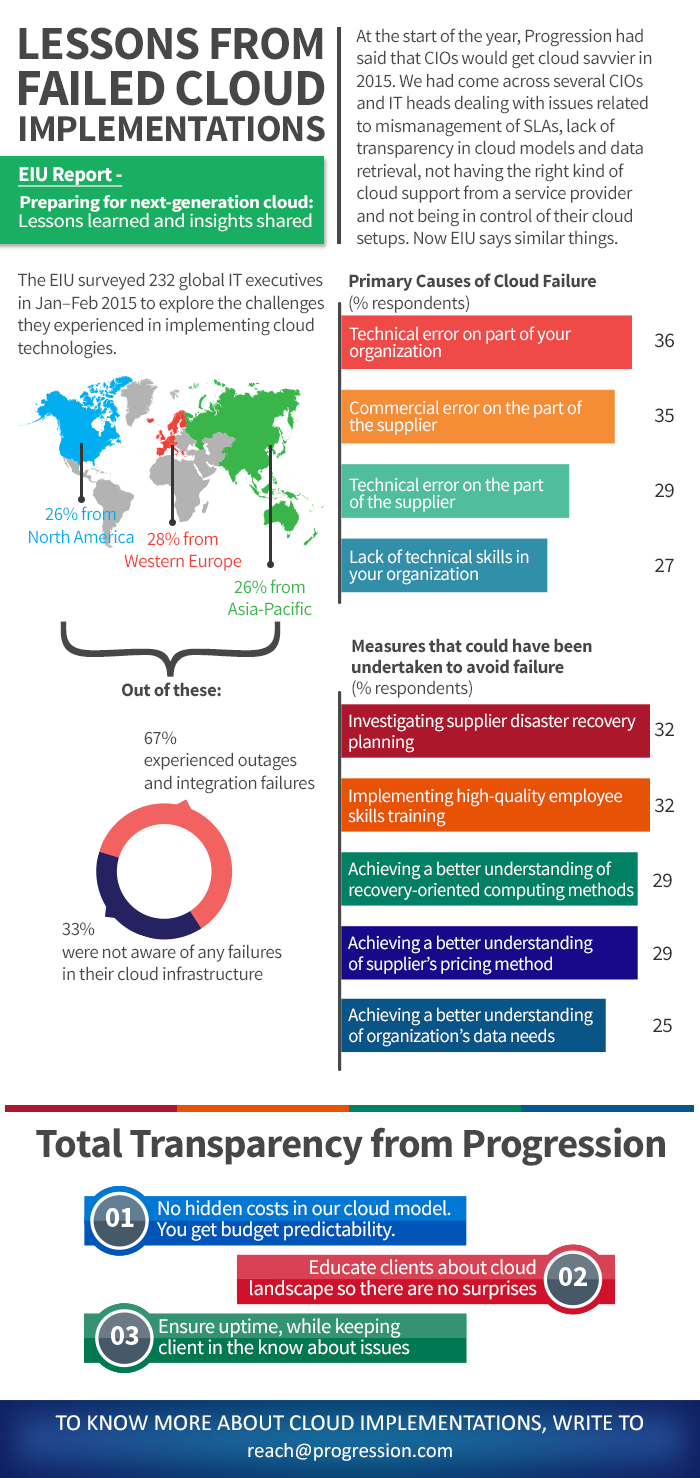At the start of the year, we had said that CIOs will get cloud savvier in 2015. We had come across several CIOs and IT heads dealing with issues related to mismanagement of SLAs, lack of transparency in cloud models and data retrieval, not having the right kind of cloud support from a service provider and not being in control of their cloud setups.
Let’s now go a step further and learn from EIU : Preparing for next-generation cloud: Lessons learned and insights shared.
The EIU surveyed 232 global IT executives in Jan–Feb 2015 to explore the challenges they experienced in implementing cloud technologies. Of these, 28% are from Western Europe, and 26% each in North America and Asia-Pacific.
Thirty three percent of the respondents said they were not aware of any failures in their cloud infrastructure, and the remaining 67 percent said they have experienced outages and integration failures. But the good news is that very few of the outages were ranked as causing high damage.
The most cited cause for the cloud failure was ‘Technical error on the part of your organization’ followed by ‘Commercial errors on the part of the supplier’. By commercial errors, the EIU refers to issues related to contracts and customer relationship management. (see graphic)

Technical errors were cited more from the organization’s side, than from the service provider’s side. This indicates that organizations face a lack of skills or experience with cloud technology. The respondents also said that technical issues are exacerbated by a lack of skilled staff and not having a business continuity/DR plan in place.
How could these issues have been minimized? One of the key insights from EIU is to have a better service provider selection process. One of the respondents said that his company has now become more stringent with selection criteria. Progression had predicted this earlier this year to happen: “We expect CIOs to now ask cloud service providers some hard questions and demand frequent DR drills in 2015.”
Another step that organizations think is important in averting issues is to implement high-quality employee skills training. With a better skilled team in place, organizations can ensure that technical errors from their end are minimized.
Among the other areas that global IT executives consider important to avert cloud failures are:
- Achieving a better understanding of recovery-oriented computing methods
- Achieving a better understanding of the supplier’s pricing model
- Achieving a better understanding of the organisation’s data needs

As a Managed Cloud & Services Provider, Progression understands all these concerns deeply, and has proactively been delivering services in line with the areas outlined above. We believe that it’s our job to run the cloud infrastructure, and the client organization should not have to be bothered about being fully equipped with cloud know-how. The job of the IT teams in organizations is to create IT value for their business, and that is best done when they are free of daily nitty gritties.

We believe in total transparency. So there are no hidden costs in our cloud model. We share the costs up front, and how they will shape up over time, and how they will change based on your potential requirements. So you get total predictability into costs, not just cloud uptime.
Since we are on the cloud side of the table, it’s our job and responsibility to help our clients navigate the still-evolving landscape of cloud environments. This is the fastest way for us to ensure that our clients have cloud setups that never fail.


